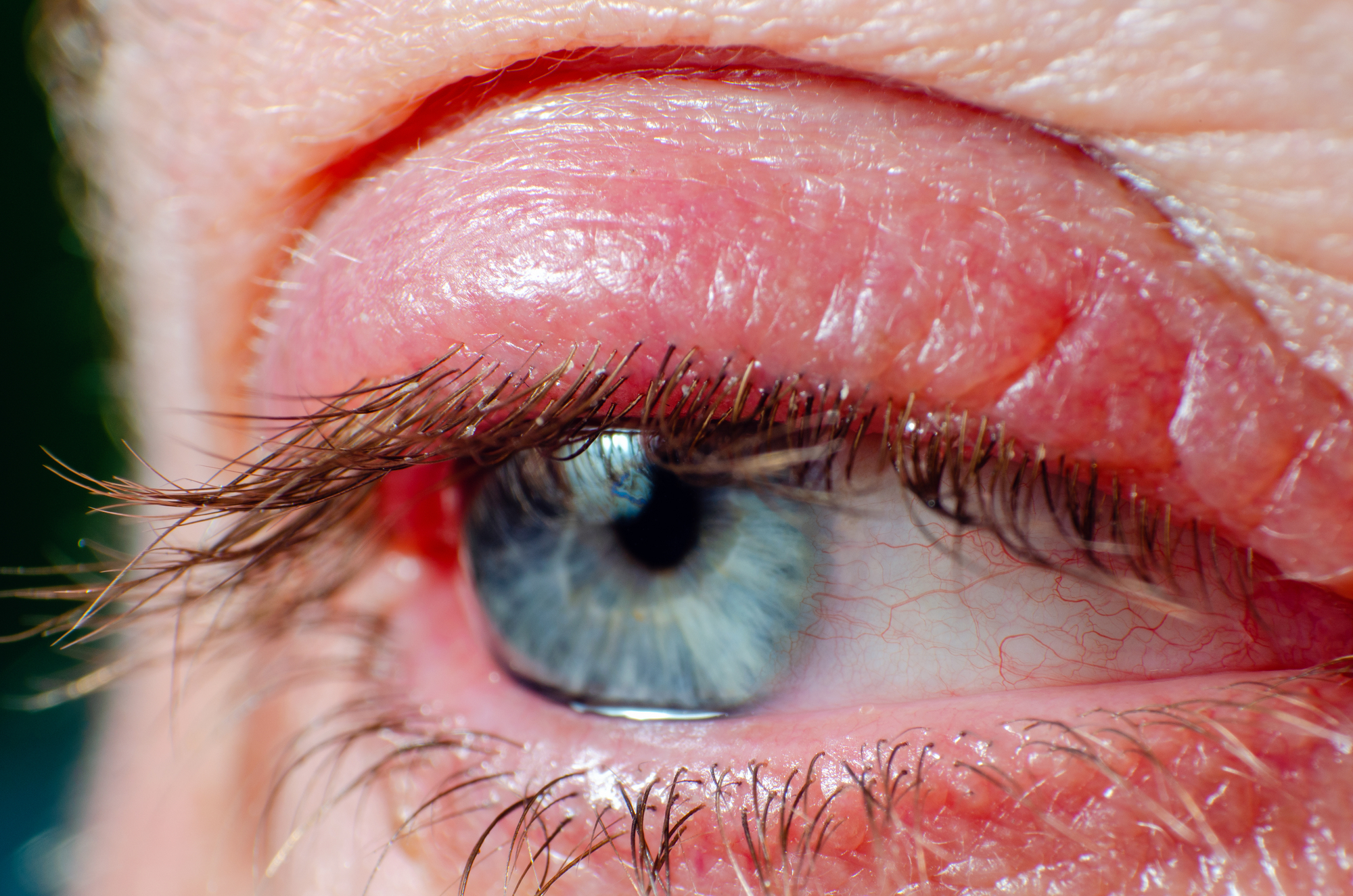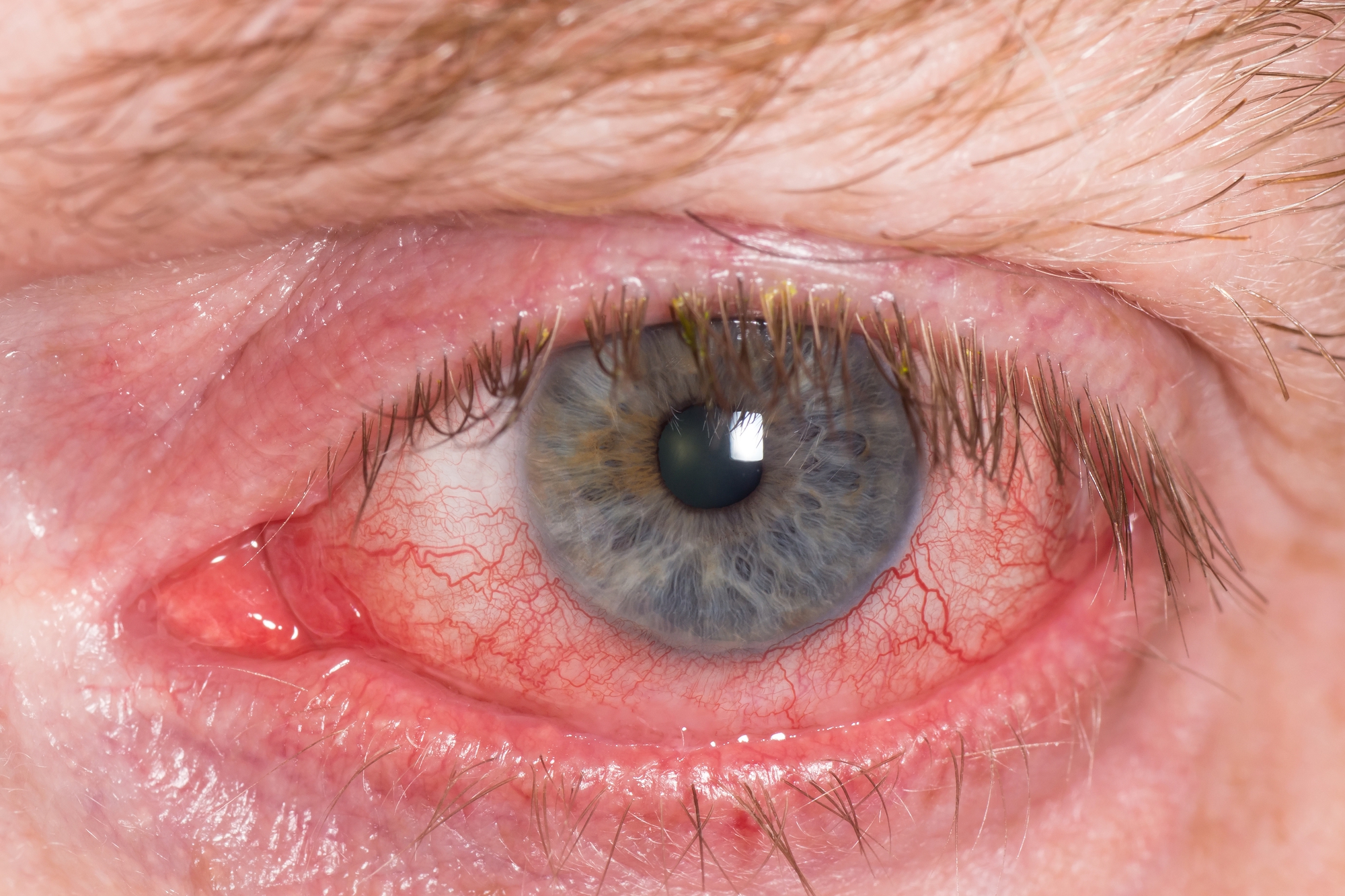Updated on October 21, 2024
Eye Irritation


Vision Center is funded by our readers. We may earn commissions if you purchase something via one of our links.
What is Eye Irritation?
Eye irritation is discomfort, itching, pain, or redness around the eye area.
It’s a common and bothersome problem that affects people of all ages.


A wide variety of factors can cause eye irritation, including:
- Environmental irritants
- Eye allergies
- Infections
- Underlying medical conditions
Determining the cause of eye irritation is essential to treat it effectively. Failure to do so can lead to serious eye problems and potentially irreversible damage.
This article provides an overview of the causes and treatments for eye irritation and when to seek medical attention.
10 Common Causes of Eye Irritation
Here are 10 common causes of eye irritation:
1. Environmental Irritants
Chemicals and environmental pollution can irritate your eyes. These eye irritants can also make you feel like there’s grit or debris stuck in your eye.
Common eye irritants include:
- Tobacco smoke
- Smog
- Dust particles
- Dry air
- Chlorinated pool water
- Accidental exposure to chemical vapors
Treatment
Most of the time, thoroughly rinsing your eye or eyes with clean, room-temperature water for 15 to 20 minutes is enough to relieve irritation.
When to See a Doctor
Seek immediate medical attention if your eye irritation doesn’t go away after rinsing. Exposure to certain chemicals may burn your eyes and cause permanent damage.
2. Eye Allergies
Seasonal allergies and sensitivities to certain substances can cause your eyes to feel irritated.
Signs and symptoms of allergic conjunctivitis (pink eye) include:
These eye irritation symptoms may occur with nasal symptoms like a runny nose or sneezing.
Treatment
If you can’t avoid the allergen that triggers your allergic reaction, you can try over-the-counter (OTC) medications. Many antihistamine eye drops and oral allergy medicines are available.
When to See a Doctor
Contact your healthcare provider if home remedies and OTC treatments fail to provide relief. They may recommend allergy shots or prescription medication to manage your symptoms.
3. Foreign Objects
A foreign object stuck in the eye can cause irritation, redness, and sensitivity to light.
Common examples include sand, sawdust, or a stray eyelash. Some objects, like glass or metal shards, can cause corneal abrasion.
Treatment
If the foreign body is simply an eyelash, you can blink it out with natural or artificial tears.
Otherwise, your doctor will carefully remove the foreign object for you. Depending on the object and the condition of your eye, they may also prescribe antibiotics to prevent an infection.
When to See a Doctor
Unless the foreign object is an eyelash that you can see, you should seek professional care. Don’t attempt to remove the foreign body by yourself.
Your doctor will examine your eye and check for signs of a scratched cornea.
4. Computer Vision Syndrome
Blue light from computer screens and other digital devices can irritate your eyes over time. Other symptoms of computer vision syndrome or digital eye strain include:
- Headaches
- Neck pain
- Shoulder pain
- Back pain
- Dry eyes
- Blurry vision
Treatment
Digital eye strain symptoms usually disappear when you stop using your computer or mobile device.
To prevent symptoms from recurring, eye doctors recommend the 20-20-20 rule. Every 20 minutes you work at a screen, take a 20-second break to look at something at least 20 feet away.
Other treatment options include:
- Practicing good posture
- Using lubricating eye drops
- Reducing glare on your screen
- Adjusting your workstation
When to See a Doctor
You should schedule a vision exam with your eye specialist if you’re experiencing symptoms of digital eye strain.
5. Eye Infection
Pink eye (conjunctivitis) is a well-known eye infection.
Depending on the type of infection, you may also experience:
- Itchy eyes
- Eyelid swelling
- Blurred vision
- Discharge of pus or mucus
- Crusting along the eyelids or lashes
Treatment
Treatment depends on the underlying cause of the eye infection:
- Viral infections. These are usually mild and clear up in a week or two.
- Bacterial infections. Typically require prescription antibiotic eye drops.
- Antifungal infections. These treatments are typically eye drops, pills, or injections.
When to See a Doctor
Call your doctor if you experience any of the eye infection symptoms listed above. They will determine the cause and recommend the most effective treatment.
6. Dry Eye Syndrome
Dry eye disease, or dry eye syndrome, is a problem with the quality or quantity of your tears. Irritation and infection can occur when your tears can’t clean and hydrate your eyes properly.
Other symptoms may include:
- Light sensitivity
- Itchy eyes
- Foreign body sensation
- Gritty sensation
- Blurry vision
- Watery eyes
Treatment
Over-the-counter eye drops may relieve mild dry eye symptoms. You can also try warm compresses and gentle eyelid massages.
Your doctor may prescribe stronger eye drops for more severe cases of dry eye. If that doesn’t work, they may recommend a procedure to plug your tear ducts.
When to See a Doctor
Call your doctor if dry eyes continue to bother you despite home treatment. You should also call your doctor if you experience changes to your vision.
7. Blocked Tear Duct
Tear ducts are passages through which tears drain from your eyes into your nose. When a tear duct is blocked, tears don’t drain normally, which can lead to eye irritation.
Other symptoms may include:
- Recurring eye infections
- Pain around the inner corner of the eye
- Crusting around the eyelid
- Watery eyes
Treatment
Your doctor may dilate the blocked tear duct or insert a small tube that allows tears to drain from the eye. Severe cases may require surgery.
When to See a Doctor
See your doctor if you have symptoms of a blocked tear duct. This condition won’t go away on its own.
8. Eye Stye
A stye (also known as a hordeolum) is a small, red, and painful lump that can irritate your eyes. It grows on the base of your eyelashes or just under your eyelid, typically due to a bacterial infection.
Treatment
Styes usually go away on their own. Applying warm compresses three to four times a day can help the stye drain faster.
A stye that doesn’t go away may require surgery to drain the pus or antibiotics to fight the infection.
When to See a Doctor
Call your doctor if a stye causes severe pain or persists despite home treatment.
9. Blepharitis
Blepharitis is eyelid inflammation. It’s generally caused by a bacterial infection or a skin condition like rosacea.
Blepharitis can make your eyes red, itchy, and irritated. You may also develop flaky scales along your eyelashes.
Treatment
Home remedies for blepharitis include warm compresses and keeping the eyelid clean. For more serious cases, your doctor may prescribe steroid or antibiotic medication.
When to See a Doctor
Blepharitis usually goes away on its own. Call your doctor if your symptoms worsen or persist despite treatment.
10. Ocular Rosacea
Rosacea is a chronic skin condition. Some people with this disease develop ocular rosacea, which causes eye irritation. Ocular rosacea can cause dry, itchy, red eyes.
Treatment
Home remedies for ocular rosacea include warm compresses, cleaning the eyelids, and over-the-counter artificial tears.
A doctor may recommend prescription medications, eye drops, or surgery for more serious cases.
When to See a Doctor
You should call your primary healthcare provider if you’re experiencing symptoms of ocular rosacea. They may prescribe medication or refer you to an eye specialist for treatment.
Listen In Q&A Format
Eye Irritation
Vision Center Podcast
Other Conditions that Can Cause Eye Irritation
Eye irritation may be due to the following medical conditions:
- Glaucoma. Glaucoma medication can cause dry eyes as a side effect, which leads to eye irritation. The disease itself can cause eye pain.
- Rheumatoid arthritis (RA). Dry eyes are a common symptom of RA. This disease can also cause pain and inflammation in the white of the eye (sclera).
- Multiple Sclerosis (MS). Eye irritation and vision problems can be early symptoms of MS.
- Cluster headaches. These headaches cause pain near the eye, which can lead to redness, swelling, and tearing.
- Brain tumor. A tumor in or near the part of your brain that controls vision can cause symptoms like blurry vision, double vision, and vision loss.
Summary
Eye irritation has a wide range of possible causes. Some causes, such as styes and digital eye strain, resolve on their own. Others, such as a blocked tear duct, require medical treatment.
Treatment for eye irritation depends on the underlying cause and can range from warm compresses to surgical procedures.
Call your doctor if the eye irritation is severe or doesn’t get better with treatment.
In this article
11 sources cited
Updated on October 21, 2024
Updated on October 21, 2024
About Our Contributors
AnnaMarie, a staff writer for Vision Center, specializes in ophthalmology, optometry, and basic optic procedures, as well as preventative eye care. With a B.A. in Journalism & New Media and minors in Creative Writing and Women, Gender & Sexuality Studies from Gettysburg College, her goal is to enhance readers' understanding of eye health. She covers a wide range of topics, from selecting the right eyeglasses and contacts to managing and preventing eye diseases, and exploring vision correction surgeries.
Dr. Melody Huang is an optometrist and freelance health writer with a passion for educating people about eye health. With her unique blend of clinical expertise and writing skills, Dr. Huang seeks to guide individuals towards healthier and happier lives. Her interests extend to Eastern medicine and integrative healthcare approaches. Outside of work, she enjoys exploring new skincare products, experimenting with food recipes, and spending time with her adopted cats.

